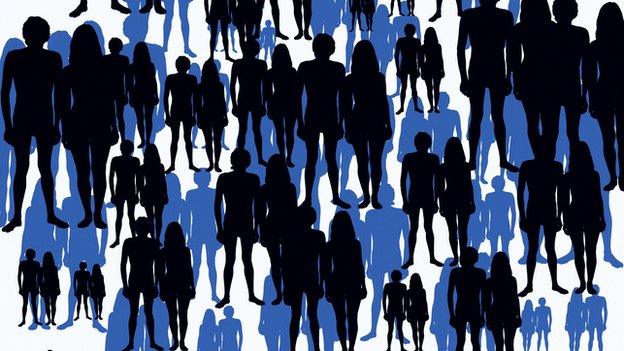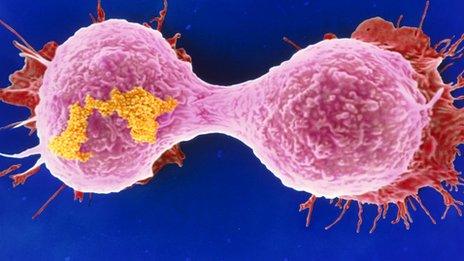Why sharing data is for greater good
- Published
- comments

The recent announcement that data from individuals' GP records would be shared with researchers inside the NHS - and potentially outside - was controversial.
In this week's Scrubbing Up, Prof Peter Johnson, Cancer Research UK's chief clinician, says while the decision is up to each of us, population data like this is crucial for making progress in tackling diseases.
Patient information is a very controversial issue.
We live in an age when all manner of information about us is collected and shared all the time and, understandably, everyone worries about who is looking at their data and what they're doing with it.
But using our records for medical research is not about some sort of free-for-all with people's data.
It is about doing the right thing and using the information that we collect in the NHS to benefit patients in the future.
We need the proper safeguards, and I am as sceptical as anyone about the idea of selling the data outside the NHS, but that is not a reason to discard the whole idea.
When we think about cancer research, we might picture scientists working in labs or patients on clinical trials, but this isn't the full story.
There are researchers making vital discoveries and saving lives right now, who will never touch a test tube and may never meet a patient.
These are the population researchers who work with vast databases of patient records, who have made some of the most important discoveries in medicine, and their type of research is as important as ever.
Cancer research is a huge success story, we know so much more now than we did 50 years ago.
But we don't know everything.

Not all cancer research is done in the lab
Patient data can be used to answer some of the big questions about cancer: what causes it, how do we treat it and how do we cure it?
For us, one of the most valuable parts of the NHS is the National Cancer Registration Service, which covers the whole of the UK and stretches back over 40 years.
This system provided the data needed to show that mesothelioma is caused by asbestos exposure and gave us the evidence behind the new innovations in the bowel screening programme.
It gives us some of the best information in the world about how well or badly we are doing, and is vital for making sure we keep improving cancer treatments all the time.
Serious threat
But without access to people's records to track how a type of treatment works this is a wasted opportunity.
Cancer registries have already saved many lives and in the future they will save many more.
However, they are under serious threat from legislation in the European Union.
The registries collect data from cancer patients automatically, although patients can object to their details being shared.
Under the new European Data Protection Regulation, this would become illegal and we are worried our national cancer registries could collapse completely.
If cancer registration is allowed to fail in this way, a unique weapon in the fight against cancer will be lost.
Our registries are a precious resource and we must protect them.
It is absolutely critical that the UK government lobbies effectively in the EU to ensure that registries and other population research is protected from this regulation.
The choice is yours.
Population research involves huge numbers, but we always remember that behind every database containing a million pieces of information, there are a million individuals and their care.
We work with information from millions of people, but every one of those has generously shared their information and is making an individual contribution to our research.
We respect that and recognise what a valuable thing this trust is.
Unlike many of the people involved in this debate, I'm not here to tell you what to do.
It's your data, it's your decision.
Everyone in England has a decision to make.
NHS England is soon going to be uploading GP records into a central database, which will be used in planning healthcare and in research.
This can be a huge force for good, if we get it right.
We need to make sure that we have rules to protect us properly, but at the same time make sure we can carry on with essential research.
- Published15 July 2013
- Published15 August 2013
- Published13 July 2013
- Published1 November 2012